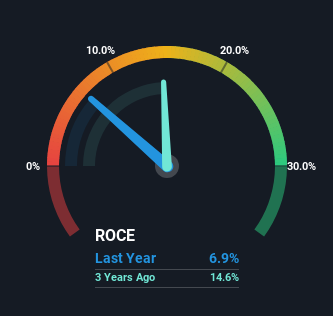Namchow Food Group (Shanghai) (SHSE:605339) May Have Issues Allocating Its Capital

There are a few key trends to look for if we want to identify the next multi-bagger. Ideally, a business will show two trends; firstly a growing return on capital employed (ROCE) and secondly, an increasing amount of capital employed. If you see this, it typically means it's a company with a great business model and plenty of profitable reinvestment opportunities. However, after investigating Namchow Food Group (Shanghai) (SHSE:605339), we don't think it's current trends fit the mold of a multi-bagger.
Understanding Return On Capital Employed (ROCE)
For those that aren't sure what ROCE is, it measures the amount of pre-tax profits a company can generate from the capital employed in its business. Analysts use this formula to calculate it for Namchow Food Group (Shanghai):
Return on Capital Employed = Earnings Before Interest and Tax (EBIT) ÷ (Total Assets - Current Liabilities)
0.069 = CN¥241m ÷ (CN¥4.3b - CN¥772m) (Based on the trailing twelve months to June 2024).
Thus, Namchow Food Group (Shanghai) has an ROCE of 6.9%. Even though it's in line with the industry average of 7.2%, it's still a low return by itself.
View our latest analysis for Namchow Food Group (Shanghai)

Historical performance is a great place to start when researching a stock so above you can see the gauge for Namchow Food Group (Shanghai)'s ROCE against it's prior returns. If you're interested in investigating Namchow Food Group (Shanghai)'s past further, check out this free graph covering Namchow Food Group (Shanghai)'s past earnings, revenue and cash flow.
The Trend Of ROCE
When we looked at the ROCE trend at Namchow Food Group (Shanghai), we didn't gain much confidence. Around five years ago the returns on capital were 18%, but since then they've fallen to 6.9%. Meanwhile, the business is utilizing more capital but this hasn't moved the needle much in terms of sales in the past 12 months, so this could reflect longer term investments. It's worth keeping an eye on the company's earnings from here on to see if these investments do end up contributing to the bottom line.
On a related note, Namchow Food Group (Shanghai) has decreased its current liabilities to 18% of total assets. That could partly explain why the ROCE has dropped. Effectively this means their suppliers or short-term creditors are funding less of the business, which reduces some elements of risk. Some would claim this reduces the business' efficiency at generating ROCE since it is now funding more of the operations with its own money.
The Bottom Line On Namchow Food Group (Shanghai)'s ROCE
In summary, Namchow Food Group (Shanghai) is reinvesting funds back into the business for growth but unfortunately it looks like sales haven't increased much just yet. Since the stock has declined 51% over the last three years, investors may not be too optimistic on this trend improving either. Therefore based on the analysis done in this article, we don't think Namchow Food Group (Shanghai) has the makings of a multi-bagger.
Namchow Food Group (Shanghai) does have some risks, we noticed 2 warning signs (and 1 which is a bit unpleasant) we think you should know about.
If you want to search for solid companies with great earnings, check out this free list of companies with good balance sheets and impressive returns on equity.
Valuation is complex, but we're here to simplify it.
Discover if Namchow Food Group (Shanghai) might be undervalued or overvalued with our detailed analysis, featuring fair value estimates, potential risks, dividends, insider trades, and its financial condition.
Access Free AnalysisHave feedback on this article? Concerned about the content? Get in touch with us directly. Alternatively, email editorial-team (at) simplywallst.com.
This article by Simply Wall St is general in nature. We provide commentary based on historical data and analyst forecasts only using an unbiased methodology and our articles are not intended to be financial advice. It does not constitute a recommendation to buy or sell any stock, and does not take account of your objectives, or your financial situation. We aim to bring you long-term focused analysis driven by fundamental data. Note that our analysis may not factor in the latest price-sensitive company announcements or qualitative material. Simply Wall St has no position in any stocks mentioned.
About SHSE:605339
Namchow Food Group (Shanghai)
Engages in the research, development, production, and sales of baking fats and oils related products.
Flawless balance sheet unattractive dividend payer.
Market Insights
Community Narratives



